最好的名词性从句导学案附答案
- 格式:doc
- 大小:102.50 KB
- 文档页数:8
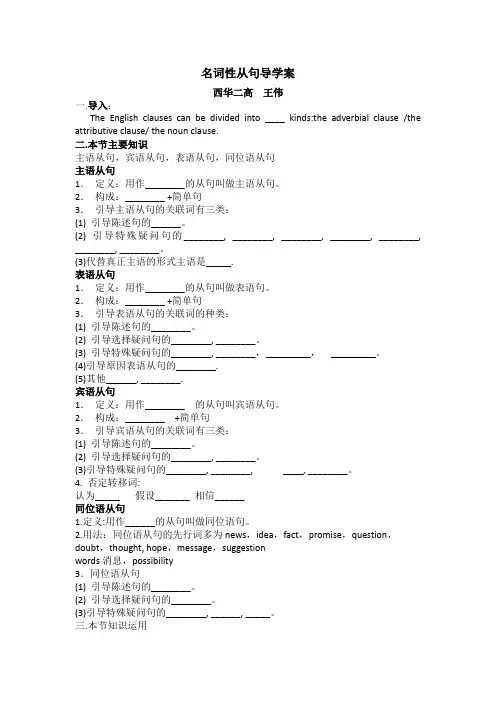
名词性从句导学案西华二高王伟一.导入:The English clauses can be divided into ____ kinds:the adverbial clause /the attributive clause/ the noun clause.二.本节主要知识主语从句,宾语从句,表语从句,同位语从句主语从句1.定义:用作________的从句叫做主语从句。
2.构成:________ +简单句3.引导主语从句的关联词有三类:(1) 引导陈述句的______。
(2) 引导特殊疑问句的________, ________, ________, ________, ________, ________, ________。
(3)代替真正主语的形式主语是_____.表语从句1.定义:用作________的从句叫做表语句。
2.构成:________ +简单句3.引导表语从句的关联词的种类:(1) 引导陈述句的________。
(2) 引导选择疑问句的________, ________。
(3) 引导特殊疑问句的________, ________,,。
(4)引导原因表语从句的________.(5)其他______, ________.宾语从句1.定义:用作________ 的从句叫宾语从句。
2.构成:________ +简单句3.引导宾语从句的关联词有三类:(1) 引导陈述句的________。
(2) 引导选择疑问句的________, ________。
(3)引导特殊疑问句的________, ________, ____, ________。
4. 否定转移词:认为_____ 假设_______ 相信______同位语从句1.定义:用作______的从句叫做同位语句。
2.用法:同位语从句的先行词多为news,idea,fact,promise,question,doubt,thought, hope,message,suggestionwords消息,possibility3.同位语从句(1) 引导陈述句的________。
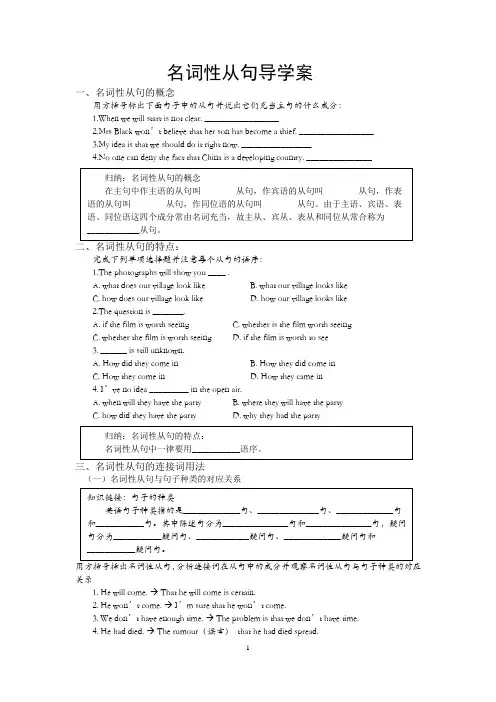
名词性从句导学案一、名词性从句的概念用方括号标出下面句子中的从句并说出它们充当主句的什么成分:1.When we will start is not clear. _________________2.Mrs Black won’t believe that her son has become a thief. _________________3.My idea is that we should do it right now. ________________4.No one can deny the fact that China is a developing country. _______________二、名词性从句的特点:完成下列单项选择题并注意每个从句的语序:1.The photographs will show you ____ .A. what does our village look likeB. what our village looks likeC. how does our village look likeD. how our village looks like2.The question is _______.A. if the film is worth seeing C. whether is the film worth seeingC. whether the film is worth seeingD. if the film is worth to see3. ______ is still unknown.A. How did they come inB. How they did come inC. How they come inD. How they came in4. I’ve no idea _________ in the open air.A. when will they have the partyB. where they will have the partyC. how did they have the partyD. why they had the party三、名词性从句的连接词用法(一)名词性从句与句子种类的对应关系关系1. He will come. → That he will come is certain.2. He won’t come. → I’m sure that he won’t come.3. We don’t have enough time. → The problem is that we don’t have time.4. He had died. → The rumour(谣言)that he had died spread.6. Will he come today or tomorrow? → We don ’t know whether / if he will come today or tomorrow.8. Who broke the window? → Who broke the window is unknown yet. 9. Which is better? → Tell me which is better.10. Where did you find the wallet? → Where I found the wallet has nothing to do with you. 11. When will he be back? → The question is when he will be back. 12. Why did he refuse the offer? → That’s why he refused the offer.13. How did he manage to escape? → I ’ve no idea how he managed to escape? 15. How beautiful the flowers are! → They exclaimed how beautiful the flowers were.从属连词:that whether(if)在从句中_________成分。
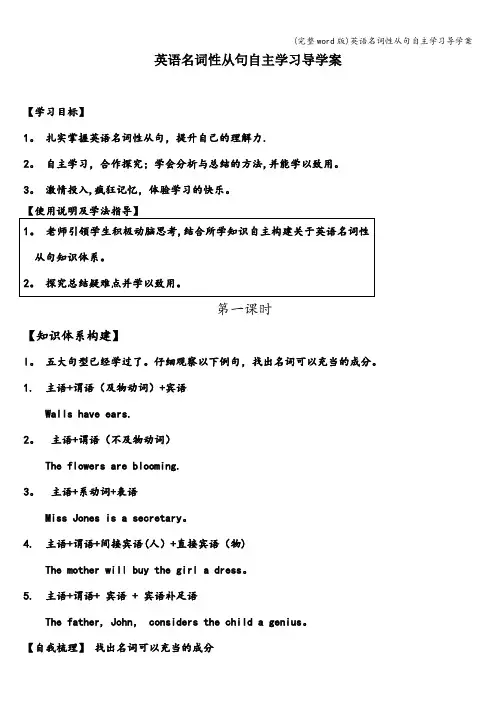
英语名词性从句自主学习导学案【学习目标】1。
扎实掌握英语名词性从句,提升自己的理解力.2。
自主学习,合作探究;学会分析与总结的方法,并能学以致用。
3。
激情投入,疯狂记忆,体验学习的快乐。
第一课时【知识体系构建】I。
五大句型已经学过了。
仔细观察以下例句,找出名词可以充当的成分。
1. 主语+谓语(及物动词)+宾语Walls have ears.2。
主语+谓语(不及物动词)The flowers are blooming.3。
主语+系动词+表语Miss Jones is a secretary。
4. 主语+谓语+间接宾语(人)+直接宾语(物)The mother will buy the girl a dress。
5. 主语+谓语+ 宾语 + 宾语补足语The father, John, considers the child a genius。
【自我梳理】找出名词可以充当的成分通过对五大句型的分析得出:名词可以用来充当______________________ 同样的道理,可以把句子中的名词换成一个小句子。
请同学们分析以下句子划线部分充当的成分。
1. Whether life will continue on the earth for millions of years to come will dependon whether this problem can be solved.2。
What it was to become was a mystery until the dust began to slowly combine into a ball moving around the sun .3。
May I ask what you were doing in my restaurant yesterday?4。
I wanted to know where all my customers had gone yesterday。
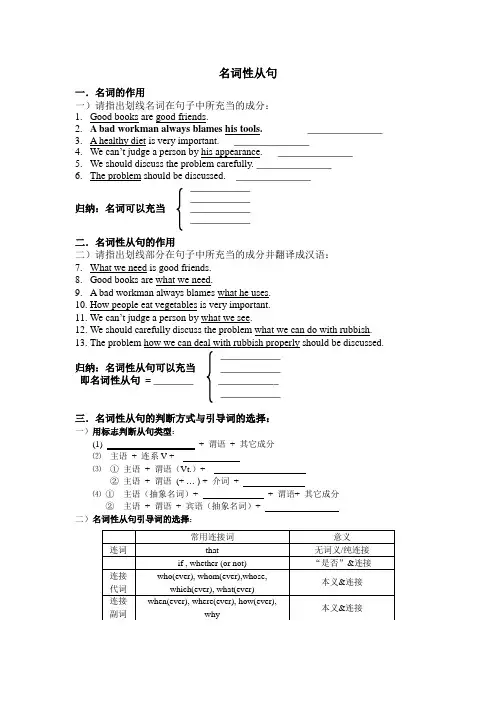
名词性从句一.名词的作用一)请指出划线名词在句子中所充当的成分:1.Good books are good friends. _______________ _____________2. A bad workman always blames his tools. _______________3. A healthy diet is very important. _______________4.We can’t judge a person by his appearance. _______________5.We should discuss the problem carefully. _______________6.The problem should be discussed. _______________________________________归纳:名词可以充当________________________二.名词性从句的作用二)请指出划线部分在句子中所充当的成分并翻译成汉语:7.What we need is good friends.8.Good books are what we need.9. A bad workman always blames what he uses.10.How people eat vegetables is very important.11.We can’t judge a person by what we see.12.We should carefully discuss the problem what we can do with rubbish.13.The problem how we can deal with rubbish properly should be discussed.____________归纳:名词性从句可以充当____________即名词性从句= ________ ________________________三.名词性从句的判断方式与引导词的选择:一)用标志判断从句类型:(1) + 谓语+ 其它成分⑵主语+ 连系V +⑶①主语+ 谓语(Vt.)+②主语+ 谓语(+ … ) + 介词+⑷①主语(抽象名词)+ + 谓语+ 其它成分②主语+ 谓语+ 宾语(抽象名词)+二)名词性从句引导词的选择:常用连接词意义连词that 无词义/纯连接if , whether (or not) “是否”&连接连接代词who(ever), whom(ever),whose,which(ever), what(ever)本义&连接连接副词when(ever), where(ever), how(ever),why本义&连接四.结合课本(P91),《金版学案》(P37)与必修一P87,完成下列练习并归纳总结陈述句回忆:必修一P87:直接引语→间接引语一般疑问句特殊疑问句祈使句哪些间接引语属于宾语从句?直接引语变成间接引语时要注意什么?三)把下列直接引语变成间接引语:14.“I don’t want to set down a series of facts in a diary,” said Anne._____________________________________________________________________ 15.The boy said, “Are you interested in English?”_____________________________________________________________________ 16.My mother said, “Did you finish your homework last night?”_____________________________________________________________________ _____________________________________________________________________ 17.“What do you call your diary?” Anne’s sister asked her._____________________________________________________________________ 18.“How did they overcome their weakness?” Father asked Anne._____________________________________________________________________ _____________________________________________________________________ 19.“When did he win the Nobel Prize?” The student asked the teacher._____________________________________________________________________ _____________________________________________________________________ 20.“Whose novels do you like best?” The teacher asked the students._____________________________________________________________________ _____________________________________________________________________ 21.“Why did he drop out of school?” Everyone wants to know._____________________________________________________________________ _____________________________________________________________________ 22.The students wondered, “Who will come to our school to make a speech?”_____________________________________________________________________ _____________________________________________________________________ 23.I think, “Women can also reach very high achievements in many fields ofscience.” __________________________________________________________ _____________________________________________________________________ 归纳:四)选用合适的词填空:if whether when where why how who which what that24.While in class, you should pay attention to __________ the teacher has said.25.Will you tell me ___________ I can keep fit and healthy?26.Please tell me __________ won the Nobel Peace Prize.27.Please tell me __________ he won the Nobel Peace Prize.28.Please tell me __________ he could win the Nobel Peace Prize.29.Her wish is _________ she could keep fit by going on a diet.30.The question is _____________ can put forward(提出) a good way to deal withpollution.31.The question is ________________________ we can manage(成功) to deal withpollution properly with the new technology.32.The question is _______________________ we can deal with pollution properly.33.The question is _____________ company can deal with pollution properly.34.His trouble is ____________________________ he can find a new job.35.His trouble is ___________ can offer him a new job.36.His trouble is ___________ he can find here.37.That is ___________ I am determined to learn English well.38.___________ is needed for the space trip is careful preparation.39.Careful preparation is ___________ is needed for the space trip.40.___________ wild life can be well protected is of great importance.41.___________ well wild life can be protected is of great importance.42.It is of great importance ___________ wild life can be well protected.43.It is of great importance ___________ well wild life can be protected.44.The energy is ___________ makes the cells able to do their work.45.Going abroad for further education is __________ he hopes best.46.The question ____________ can go for a picnic hasn’t been decided.47.The question ___________________ we can go for a picnic hasn’t been decided.48.The question ___________________ we can go for a picnic hasn’t been decidedbecause the weather is changeable these days.49.The question ___________________ we can go for a picnic on this comingSunday hasn’t been decided.50.The question ___________________ we can go for a picnic by bike to the lake onthis coming Sunday hasn’t been decided.51.The fact __________ women can work as well as men is clear.52.The fact is clear __________ women can work as well as men.53.It is clear ___________ women can work as well as men.54.It is well known __________ traditional Chinese diet is one of the healthiest.归纳:确定为名词性从句后,_________________________________________归纳:(P92)为了避免主语显得过长,可以用__________ 作为句子的形式主语,把________________移到句子的末尾。
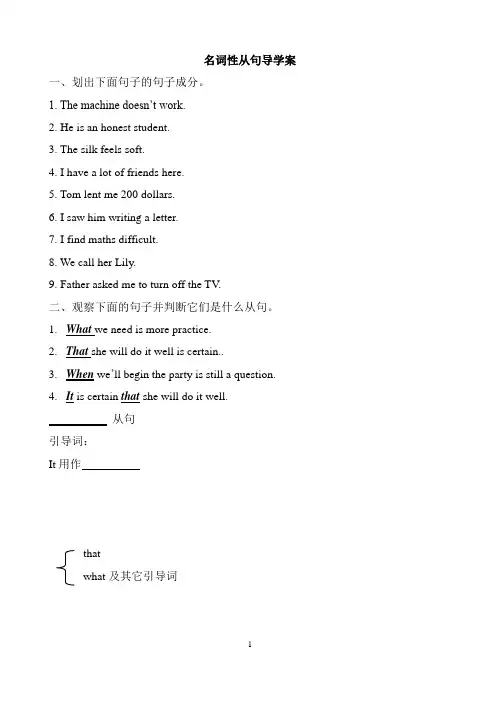
名词性从句导学案一、划出下面句子的句子成分。
1. The machine doesn’t work.2. He is an honest student.3. The silk feels soft.4. I have a lot of friends here.5. Tom lent me 200 dollars.6. I saw him writing a letter.7. I find maths difficult.8. We call her Lily.9. Father asked me to turn off the TV.二、观察下面的句子并判断它们是什么从句。
1.What we need is more practice.2.That she will do it well is certain..3.When we’ll begin the party is still a question.4.It is certain that she will do it well.从句引导词:It用作thatwhat及其它引导词1.I don’t know what you mean.2.I don’t know that he did it.3.I don’t know how I can do it well.4.We consider it necessary that he did it.5.We must never think (that) we are good in everything and that others are good innothing.6.I will appreciate it if you can give me a hand.7.I doubt if/ whether the speeches will be good.8.I don’t doubt (that) she’ll go over the lessons.9.Everything depends on whether the situation will improve.10.Whether I’ll go there isn’t decided.11.He doesn’t know whether to stay or not.1.The question is that I don’t know who he is.2.The question is what I should do.3.The actor is no longer what he used to be.4.The reason why I didn’t come is that I was ill yesterday.5.This is because I was ill.6.That is why I didn’t come.1.The news that they had won the game soon spread over the whole school.2.The news that you told me yesterday was really disappointing.。
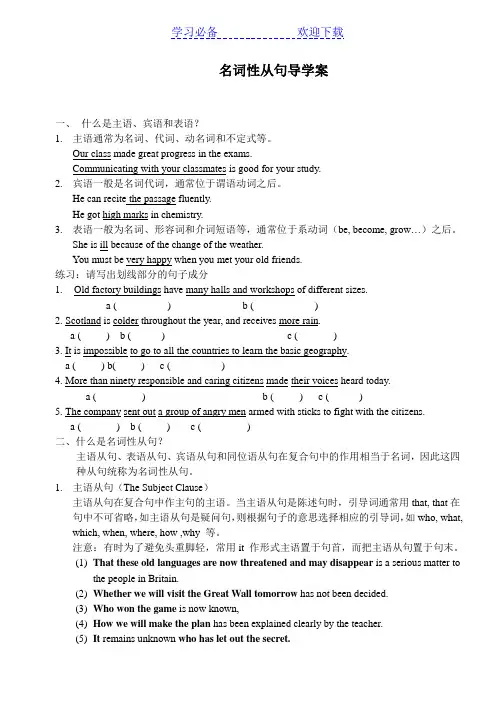
名词性从句导学案一、什么是主语、宾语和表语?1.主语通常为名词、代词、动名词和不定式等。
Our class made great progress in the exams.Communicating with your classmates is good for your study.2.宾语一般是名词代词,通常位于谓语动词之后。
He can recite the passage fluently.He got high marks in chemistry.3.表语一般为名词、形容词和介词短语等,通常位于系动词(be, become, grow…)之后。
She is ill because of the change of the weather.You must be very happy when you met your old friends.练习:请写出划线部分的句子成分1.Old factory buildings have many halls and workshops of different sizes.a ( )b ( )2. Scotland is colder throughout the year, and receives more rain.a ( )b ( )c ( )3. It is impossible to go to all the countries to learn the basic geography.a ( ) b( ) c ( )4. More than ninety responsible and caring citizens made their voices heard today.a ( )b ( )c ( )5. The company sent out a group of angry men armed with sticks to fight with the citizens.a ( )b ( )c ( )二、什么是名词性从句?主语从句、表语从句、宾语从句和同位语从句在复合句中的作用相当于名词,因此这四种从句统称为名词性从句。
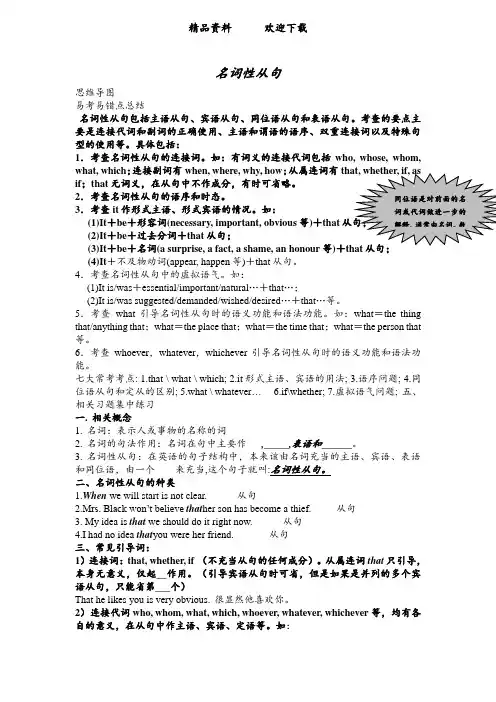
名词性从句思维导图易考易错点总结名词性从句包括主语从句、宾语从句、同位语从句和表语从句。
考查的要点主要是连接代词和副词的正确使用、主语和谓语的语序、双重连接词以及特殊句型的使用等。
具体包括:1.考查名词性从句的连接词。
如:有词义的连接代词包括who, whose, whom,what, which ;连接副词有when, where, why, how ;从属连词有that, whether, if, asif ;that 无词义,在从句中不作成分,有时可省略。
2.考查名词性从句的语序和时态。
3.考查it 作形式主语、形式宾语的情况。
如: (1)It +be +形容词(necessary, important, obvious 等)+that 从句; (2)It +be +过去分词+that 从句;(3)It +be +名词(a surprise, a fact, a shame, an honour 等)+that 从句;(4)It +不及物动词(appear, happen 等)+that 从句。
4.考查名词性从句中的虚拟语气。
如:(1)It is/was +essential/important/natural …+that …;(2)It is/was suggested/demanded/wished/desired …+that …等。
5.考查what 引导名词性从句时的语义功能和语法功能。
如:what =the thingthat/anything that ;what =the place that ;what =the time that ;what =the person that等。
6.考查whoever ,whatever ,whichever 引导名词性从句时的语义功能和语法功能。
七大常考考点: 1.that \ what \ which; 2.it 形式主语、宾语的用法; 3.语序问题; 4.同位语从句和定从的区别; 5.what \ whatever … 6.if\whether; 7.虚拟语气问题; 五、相关习题集中练习一. 相关概念1. 名词:表示人或事物的名称的词2. 名词的句法作用:名词在句中主要作___,_____,表语和______。
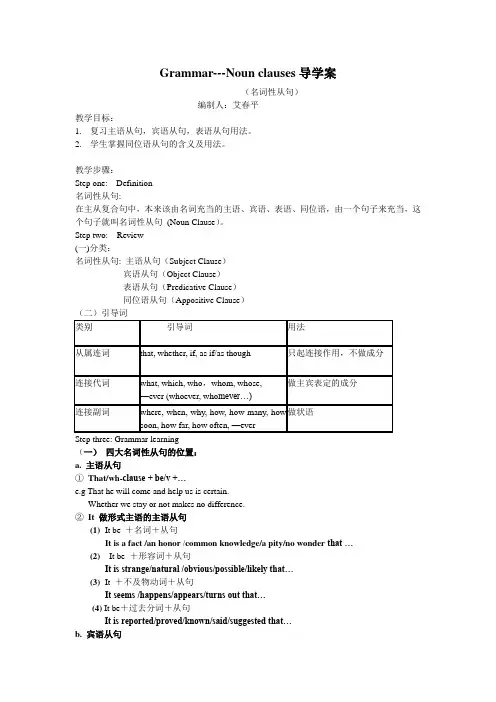
Grammar---Noun clauses导学案(名词性从句)编制人:艾春平教学目标:1.复习主语从句,宾语从句,表语从句用法。
2.学生掌握同位语从句的含义及用法。
教学步骤:Step one: Definition名词性从句:在主从复合句中,本来该由名词充当的主语、宾语、表语、同位语,由一个句子来充当,这个句子就叫名词性从句(Noun Clause)。
Step two: Review(一)分类:名词性从句: 主语从句(Subject Clause)宾语从句(Object Clause)表语从句(Predicative Clause)同位语从句(Appositive Clause)(二)引导词Step three: Grammar learning(一)四大名词性从句的位置:a. 主语从句①That/wh-clause + be/v +…e.g That he will come and help us is certain.Whether we stay or not makes no difference.②It 做形式主语的主语从句(1)It be +名词+从句It is a fact /an honor /common knowledge/a pity/no wonder that …(2)It be +形容词+从句It is strange/natural /obvious/possible/likely that…(3)It +不及物动词+从句It seems /happens/appears/turns out that…(4) It be+过去分词+从句It is reported/proved/known/said/suggested that…b. 宾语从句①主语+ 及物动词+ that/wh-clauseThey know that the habit may kill them.②主语+… + 介+ wh-clauseEverything depends on whether you have enough moneyc. 表语从句主语+be动词/系动词(appear/seem/look/sound/feel/remain) + that/wh-clause/as if/as though d. 同位语从句跟在抽象名词后,对名词加以补充说明,解释名词的实际内容,常用的名词有advice ,fact, news, idea, promise等e.g. I have no idea when he will come back home.(二)名词性从句考点归纳1. .名词性从句的语序判断下列句子是否正确,(T or F)1.他是怎么成功的仍然是个谜。
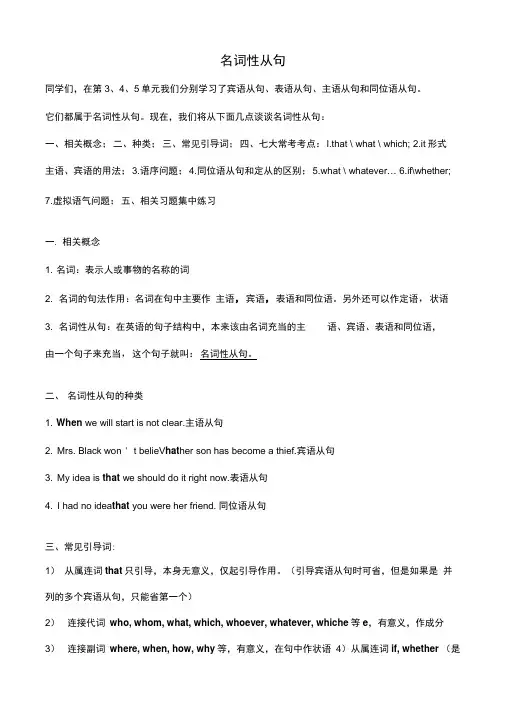
名词性从句同学们,在第3、4、5单元我们分别学习了宾语从句、表语从句、主语从句和同位语从句。
它们都属于名词性从句。
现在,我们将从下面几点谈谈名词性从句:一、相关概念;二、种类;三、常见引导词;四、七大常考考点:l.that \ what \ which; 2.it形式主语、宾语的用法;3.语序问题;4.同位语从句和定从的区别;5.what \ whatever… 6.if\whether;7.虚拟语气问题;五、相关习题集中练习一.相关概念1. 名词:表示人或事物的名称的词2. 名词的句法作用:名词在句中主要作主语,宾语,表语和同位语。
另外还可以作定语,状语3. 名词性从句:在英语的句子结构中,本来该由名词充当的主语、宾语、表语和同位语,由一个句子来充当,这个句子就叫:名词性从句。
二、名词性从句的种类1. When we will start is not clear.主语从句2. Mrs. Black won ' t belieV hat her son has become a thief.宾语从句3. My idea is that we should do it right now.表语从句4. I had no idea that you were her friend. 同位语从句三、常见引导词:1)从属连词that只引导,本身无意义,仅起引导作用。
(引导宾语从句时可省,但是如果是并列的多个宾语从句,只能省第一个)2)连接代词who, whom, what, which, whoever, whatever, whiche等e,有意义,作成分3)连接副词where, when, how, why等,有意义,在句中作状语4)从属连词if, whether (是否)(if只能引导动词、形容词之后的宾语从句)1. What he said has nothing to do with you.2. When we'start tomorrow will be told soon.3. That he did such a thin gsatisfied me.4. How we can protect cultural relics needs to be discussed.四、名词性从句七大常考考点考点1:A.连接词:that与what的区别What we can ' t get seems better tha h n at we have.That a new teacher will come to our school is true.that只起连接作用,无意义,在从句中不充当任何成分;what既有连接作用,又要在从句中作成分(主语,宾语,表语)(…的东西;物;话;时间;地点;人物擞目等不同概念)1. After five hours drive, they rea Wtedt was called the hometow n of the goddess.2. The other day, my brother drove his car down the street at what was a dangerous speed.3. The village was quite differe nt from what it used to be.4. That the earth is round is known to us all.5. Father made a promis&hat if I passed the exam in ati on he would buy me a computer.B. what (什么)/ which (表选择,哪一个)1. ---Do you know what Mr. Black ' s addres? is---He may live at No. 18 or No. 19 of Bridge Street. I whi o h not sure of2. I read about it in some books or other, does it mattewhich it was?咼考题选萃1) ____ y ou don ' t like him is none of my bus in ess.A. WhatB. WhoC. ThatD. Whether2) ___ h e said at the meeti ng ast oni shed everybody prese nt.A. WhatB. ThatC. The factD. The matter3) There ' s a feeling in me ___ we kn'w weve ra UFO is.A. thatB. whichC. of whichD. what考点2 : it作形式主语,形式宾语的用法A. it作形式主语1. 他犯了那样一个错误真是遗憾。
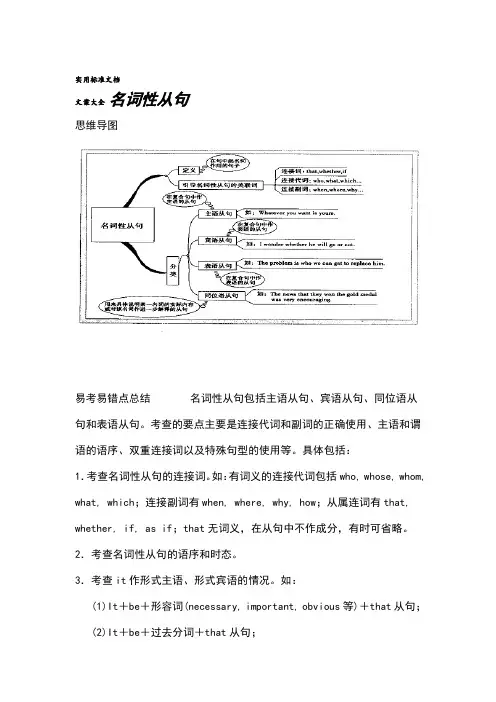
实用标准文档文案大全名词性从句思维导图易考易错点总结名词性从句包括主语从句、宾语从句、同位语从句和表语从句。
考查的要点主要是连接代词和副词的正确使用、主语和谓语的语序、双重连接词以及特殊句型的使用等。
具体包括:1.考查名词性从句的连接词。
如:有词义的连接代词包括who, whose, whom, what, which;连接副词有when, where, why, how;从属连词有that, whether, if, as if;that无词义,在从句中不作成分,有时可省略。
2.考查名词性从句的语序和时态。
3.考查it作形式主语、形式宾语的情况。
如:(1)It+be+形容词(necessary, important, obvious等)+that从句;(2)It+be+过去分词+that从句;(3)It+be+名词(a surprise, a fact, a shame, an honour等)+that 从句;(4)It+不及物动词(appear, happen等)+that从句。
4.考查名词性从句中的虚拟语气。
如:(1)It is/was+essential/important/natural…+that…;(2)It is/was suggested/demanded/wished/desired…+that…等。
5.考查what引导名词性从句时的语义功能和语法功能。
如:what=the thing that/anything that;what=the place that;what=the time that;what=the person that等。
6.考查whoever,whatever,whichever引导名词性从句时的语义功能和语法功能。
七大常考考点: 1.that \ what \ which; 2.it形式主语、宾语的用法; 3.语序问题; 4.同位语从句和定从的区别; 5.what \ whatever…6.if\whether;7.虚拟语气问题; 五、相关习题集中练习实用标准文档文案大全一. 相关概念1. 名词:表示人或事物的名称的词2. 名词的句法作用:名词在句中主要作___,_____,表语和______。
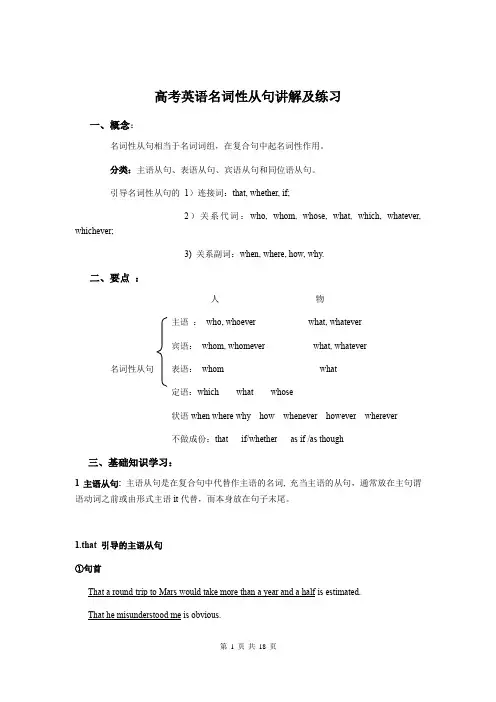
高考英语名词性从句讲解及练习一、概念:名词性从句相当于名词词组,在复合句中起名词性作用。
分类:主语从句、表语从句、宾语从句和同位语从句。
引导名词性从句的1)连接词:that, whether, if;2)关系代词:who, whom, whose, what, which, whatever, whichever;3) 关系副词:when, where, how, why.二、要点:人物主语:who, whoever what, whatever宾语:whom, whomever what, whatever名词性从句表语:whom what定语:which what whose状语when where why how whenever however wherever不做成份:that if/whether as if /as though三、基础知识学习:1主语从句: 主语从句是在复合句中代替作主语的名词, 充当主语的从句,通常放在主句谓语动词之前或由形式主语it代替,而本身放在句子末尾。
1.that 引导的主语从句①句首That a round-trip to Mars would take more than a year and a half is estimated.That he misunderstood me is obvious.That引导主语从句,放句首,不做任何成分,不可省略。
②用形式主语it来引导句子A. that引导主语从句放句首时,有时会为了避免头重脚轻,保持句子平衡,常用it做形式主语,把真正的that引导的主语从句放句后。
It is strange that he made no answer.It is known to all that the earth is round.B. 用it做形式主语的主语从句结构注意:i. It作形式主语和it引导强调句的比较It作形式主语代替主语从句,主要是为了平衡句子结构,主语从句的连接词没有变化。
名词性从句——导学案学习目标:一、名词性从句的分类与特点二、引导词三、个性考点四、难点突破五、常见句型的写作应用一、名词性从句的分类与特点1.思考划线从句在下列句子中所做成分?并判定属于哪类名词性从句?(Task 1)1) What you said left a deep impression on me. ( )2) My suggestion is that you should take notes . ( )3) I wonder whether you will follow the rules. ( )4)The fact that she was late surprised us. ( ) 【归纳总结】从句在句子中相当于____,故称名词性从句,它包括_______,_______, ______, 以及_________。
与定从和状从一样,从句前有一个______引导,______语序。
【高考链接】(10上海37)When changing lanes(车道), a driver should use his turning signal to let other drivers know ______.A. he is entering which laneB. which lane he is enteringC. is he entering which laneD. which lane is he entering二、名词性从句的引导词1.观察下列句子,分析that所引导从句类型及特点?(Task 2)①I Know that the earth turns around the sun.②That the earth turns around the sun is known to all.③Tianjin is a city that is on the coast of Bohai.④It was in the classroom that Tom found my pen yesterday.【归纳总结】句___和____中that引导名词性从句,that特点:_______________; 句_____中that引导定从,特点:____________________;句_____为强调句,that特点:________________。
名词性从句基本概念,做题技巧及步骤一.名词性从句包括____________,_____________,____________,_____________。
二.找出下列句子中的名词性从句,并指出类型1. what I want is a book2.This is what I want.3.Tom doesn’t know what I want4.Tom has no idea what I want三.直入考点具体到各种从句须注意的地方一.主语从句(一)whether与if____________ the work can be completed on time is doubtful.It is doubtful ____________ the work can be completed on time.主语从句位于复合句句首时只用____________引导,用it作形式主语,真正的主语从句放主句后面时可用____________(二)。
that 在主语从句中不充当成分,但_________省略(三)。
主谓一致。
what they need_________books.what they need_________ love.主语从句作主语,主句谓语动词一般用单数形式;但_________引导主语从句时,主句谓语动词的数应依据_________语的名词而定。
(四)。
在主语从句中用来表示惊奇、不相信、惋惜、理应如此等,谓语动词用虚拟语气"(should) +do",常用的句型有:1。
It is necessary (important, natural, strange…) that从句2。
It is a pity(a shame, no wonder…) that从句3。
It is suggested (requested, proposed, desired…)that从句It is strange that she _____________ so.(用think形式填空)二.宾语从句(一)。
1 / 31 名词性从句 学习目标: 掌握名词性从句的四大类型以及它们的用法,并能判断出练习中的句子属于什么从句类型,会做一些简单的练习。 学习重点: 1.能快速判断出一个句子属于什么类型的从句。 2. 注意宾语从句的时态呼应。 学习难点: 1. that什么情况下可以省略,什么情况下不可以省略。 2. whether 和if 什么时候可以互换,什么时候不可以互换。 3. 如何区分同位语从句与定语从句。 ◆ 学前尝试: 1.______ the baby could speak made his parents very happy. A. That B. What C. Why D. If 2. I wonder ______ you will go shopping or stay at home. A. that B. if C. whether D. what 3. This is ______ he was often late for school. A. what B. that C. why D. whether 4. We all know the truth ______ the earth ______ around the sun. A. if; moved B. that; moves C. why; move D. whether; move ◆ 探究学习: 一.名词性从句的含义 尝试:判断划线部分的句子在主句中充当的成分。 1. What he does is important. ( ) 2. This is what he does every day. ( ) 3. I don’t like what he does every day. ( ) 4. I don’t know about the fact that he is a teacher. ( ) 思考: 1. 一个句子在连接词的引导下,在句子中起________作用的句子叫名词性从句。 2.名词性从句相当于名词词组, 它在复合句中能担任哪些句子成分? _______________________________________________________________________ 3. 根据从句在句中不同的语法功能,名词性从句可分为哪四类呢? _______________________________________________________________________ 二.引导名词性从句的连接词: 尝试:判断下面名词性从句的连接词,并判断连接词在从句中充当的成分。 例:No one knows who took away the key. ( who )( 主语 ) 1. I want to know whether/if she still lives here. ( )( ) 2. What she said is not true. ( )( ) 3. Who broke the window has not been found out. ( )( ) 4. He asked whose handwriting is the best in our class. ( )( ) 5. That is why she left home yesterday. ( )( ) 6. Have you heard the news that Mary will be back soon? ( )( ) 7. I really feel that he needs more experience. ( )( ) 8. It is unwise to give your child whatever he wants. ( )( ) 思考: 1、 连接代词:who, whoever, whose, whom, whomever, what, which________词义,在从句中_____担任成分,担任哪些成分?________________________________________ I don’t believe __________ he has achieved so far. __________ breaks the law should be punished. 2、连接副词:when, where, why, how________词义,在从句中_____担任成分,担任哪些成分?________________________________________ __________ we will hand in the project will be discussed later. Parents are thought to understand __________ important education is to their children’s future. 3、从属连词:that, whether, if, as if, as though。that ____词义,在从句中____担任成分,有时可省略;if (whether), as if_______词义,但在从句中_______担任成分。 I don’t care about __________ you have money or not. The problem is __________ Tom is able to arrive on time. __________ the meeting will be held here is not decided yet. It looks __________ it is going to rain. The truth is __________he didn’t come for the concert. __________ the earth is round is true. 总结: 连接词 词义 担任成分 关系代词 关系副词 从属连词
名词性从句学案名词性从句学案一、学习目标1、本阶段大纲要求近年来,引导名词性从句的连接代词及连接副词为高考必考项目。
此语法项目除单选外,完形,短文改错也考。
另外学好它,对阅读理解是大有好处的。
名词性从句包括主语从句、宾语从句、表语从句和同位语从句2、本阶段重点、难点1表命令建议order,(命令),suggestion, advice(建议)的名词后的表语从句2.that.whether的区别3.What, that, which4:that的省略5: whoever引导的名词性从句6:because引导的表语从句7:名词性从句皆用陈述语序二、基础知识体系、重点内容、题的类型及解题方法等基础知识体系名词性从句的连接词按其在从句中所起的作用分为:1)连接代词:who(-ever), what(-ever), which(-ever), whom(-ever), whose2)连接副词:when, where, why, how3)连接词:that, whether, if连接代词和连接副词在从句中充当一定的句子成分,而连接词在从句中不充当句子成分,只起连接作用名词性从句的难点把握.1由whoever/whatever/whichever/whomever引导的名词性从句这些词引导的名词性从句相当于带有定语从句的名词词组:whoever=anyone who…“任何……的人”;whomever是whoever的宾格形式whatever=anything that…“任何……的物”whichever=any…that…“任何……的(已知范围内的或上文提到过的)人或物”that引导的同位语从句与定语从句的区别:The suggestion that the students (should) have plenty of exercise is very good.The suggestion (that/which) he raised at the meeting is very good.对比发现上句中的that只起连接作用,在从句中不充当任何成分,因此它引导的是同位语从句,其中that不能省略;下句中that不仅起引导作用,同时在从句中还充当了动词raised的宾语,因此它是定语从句,此时that可用which代替,又因其在定语从句中充当宾语,故又可省略。
1 名词性从句(noun clauses) 教学目标:掌握名词性从句的四大类型以及它们的用法,并能判断出练习中的句子属于什么从句类型,会做一些简单的练习。 教学重点: 1. 主语从句,宾语从句,表语从句,同位语从句,让学生能快速判断出一个句子属于什么类型的从句。 2. 注意宾语从句的时态呼应。 教学难点: 1. that什么情况下可以省略,什么情况下不可以省略。 2. whether 和if 什么时候可以互换,什么时候不可以互换。 3. 如何区分同位语从句与定语从句。 教学过程: Lead—in: exercises 1.______ the baby could speak made his parents very happy. A. That B. What C. Why D. If 2. I wonder ______ you will go shopping or stay at home. A. that B. if C. whether D. what 3. This is ______ he was often late for school. A. what B. that C. why D. whether 4. We all know the truth ______ the earth ______ around the sun. A. if; moved B. that; moves C. why; move D. whether; move 完成以上四个题目,并分别指出它们是什么从句,从而导出名词性从句的学习。 一.名词性从句的概念: 一个句子在连接词的引导下,在句子中起名词作用的句子叫名词性从句。 二.名词性从句的功能: 相当于名词词组, 它在复合句中能担任主语、宾语、表语、同位语、介词宾语等。 His job is important. (主语) What he does is important. (主语从句) This is his job. (表语) This is what he does every day. (表语从句) I don’t like his job. (宾语) I don’t like what he does every day. (宾语从句) I don’t know about the man, Mr. White. (同位语) I don’t know about the fact that he is a teacher. (同位语从句) 得出结论:因此根据它在句中不同的语法功能,名词从句又可分为四类,即:主语从句、宾语从句、表语从句和同位语从句。 三.引导名词性从句的连接词: 单词 词义 在词中所充当的成分
连词
that / / if / whether 是否 /
连接 代词
what (ever) (无论)什么 主、宾、表 which (ever) (无论)哪个 主、宾、定 who (ever) (无论)谁 主、、宾、表 whom (ever) (无论)谁 宾
whose 谁的 定
连接 副词 when 什么时候 状 where 在哪里 状 why 为什么 状 how 怎样 状
1、连接代词:who, whoever, whose, whom, whomever, what, which。有词义,在从句中担任成分,如主语、表语、宾语、或定语等。 He did ________ he could to save the drowning girl. __________ breaks the law should be punished. It is generally considered unwise to 2
give a child ________ he or she wants. A. however B. whatever C. whichever D. whenever ______ broke the glass yesterday is not
clear. 2、连接副词:when, where, why, how。有词义,在从句中担任成分,作状语。 Parents are thought to understand _______ important education is to their children’s future. That is _______ I didn’t attend the meeting. 3、连接词:that, whether, if, as if, as though。that 无词义,在从句中不担任成分,有时可省略;if (whether), as if虽有词义,但在从句中不担任成分。 I don’t care about __________ you have money or not. The problem is __________ Tom is able to arrive on time. __________ the meeting will be held here is not decided yet. It looks __________ it is going to rain. The truth is __________he didn’t come for the concert. __________ the earth is round is true. 四.名词性从句的类型: 1. 主语从句:在复合句中作主句的主语。连接词有that, whether; who, what ,which; when ,where, how, why 等。 如: ________________________(他们是如何募集到这些钱) remains a problem. ________________________(我们找不到回家的路) was really bad news. ________________________(任何第一个来的人) will get the ticket. ___________________ (他会去哪里)is not clear. 注意: 1. 为避免主语冗长,句子头重脚轻, 经常用it作形式主语, 主语从句放在后面作真正的
主语。 That light travels in straight lines is known to all. = ____ is known to all ______________________________. 记住以下it作形式主语,that引导真正的主语从句的句型: It’s no wonder that…难怪…/ It’s a pity/a fact /a common knowledge (众所周知)/ common sense (…是常识) / good news …(是个好消息)that… It’s likely / possible / important / necessary / clear/obvious (很明显)/certain (确信的是) that…很可能 / 重要的是… / 必要的是… / 很清楚… It’s said / reported that…据说/据报道…/It’s been announced / declared that…已经通知/宣布… It seems / appears (….好像)/ happens that…碰巧… It worried her a bit ______ her hair was turning grey. A. while B. that C. if D. for It remains a question ______ we can get so much money in such a short time. A. how B. that C. when D. what It is known to us ______ where there is pollution, there is harm. A. which B. where C. what D. that 很遗憾你没有来参加聚会。_________________________________ 难怪你又失败了。 _________________________________ 很明显你犯了一个大错。 _________________________________ 据报道这种药能减少疼痛。 _________________________________ 他打电话时我正好不在家。 __________________________________ 2. 单个的主语从句作主语时, 谓语动词用句单数形式;如果是两个或两个以上的主语 3
作主语,谓语动词则视情况而定。 When and where he was born hasn’t been found. When he was born and where he was born haven’t been found. When and why the person was murdered is still unknown. When the person was murdered and why he was murdered are still unknown. Exercises: .______ makes this shop different is that it offers more personal services. A. What B. Who C. Whatever D. Whoever ______I can pay back the help that people give me makes me very happy. A. Where B. What C. That D. How It’s not clear ______ was responsible for the accident. A. Who B. What C. How D. That ______ in the regulations that you should not tell other people the password of your e-mail account. A. What is required B. What requires C. It is required D. It requires 2. 表语从句:在复合句中作主句的表语。引导词有连词that , whether, as if, as though; who, what, which, whose; when, where, how, why, because 等。如: The problem is ___that__ we didn’t get in touch with him. This is __how__ Henry solved the problem. His suggestion is __that__ we (should) finish the work at once. It looked _as if__ it was going to rain. The reason __why__ we didn't trust him is ___that__ he has often lied. 注意: 1. 如果句子的主语是suggestion, advice, order, demand, proposal等名词时,后面引导的表语从句用should+动词原形,should可省略。 他的建议是我们应该马上完成工作. His suggestion is that we (should) finish the work at once. 2. The reason why ...is that … … 的理由是,… 的原因是… The reason __________ he was late again was __________ he was caught in the traffic jam. The reason ______ I have to go is ______ my mother is ill in bed. A .why; why B. why; because C. why ; that D. that; because 3. It is because … 这是因为… Exercises: This is ______ she was born. A. where B. which C. that D. what The question is ______ we can’t go there today. A. that B. what C. which D. when The reason why he has made such great progress is ______ he has never wasted his time. A. because B. why C. that D. what My advice is that he ______ school by bike. A. go to B. would go to C. goes to D. went to ______ she couldn’t understand was ______ fewer and fewer students showed interest in her lessons. A. What; why B. That; what C. What; because D. Why; that Energy is ______ makes things work. A. what B. everything C. something D. anything 3.宾语从句:在复合句中作主句的宾语。 引导词有连词that , whether, if; who, whom, whose, what ,which; when ,where, how, why 等。宾语分为动词宾语和介词宾语。因此宾语从句一般位于_____或者 后面。某些形容词如sure, happy, glad,pleased 等之后也可以带有宾语从句。 如: (1) V + 宾语从句,即“动宾”: We believe that he is honest. I asked if they had a cheap suit.